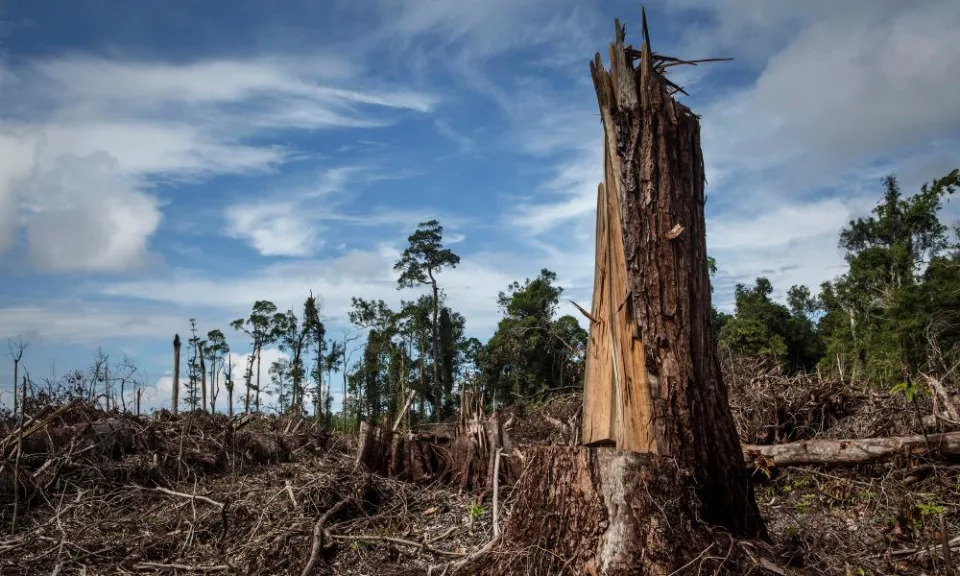Fiona Harvey and Helena Horton
Mon, 3 April 2023

Photograph: Ulet Ifansasti/Getty Images
The UK’s membership of a Pacific trade agreement will result in more deforestation overseas, endanger animal welfare and “make a mockery” of the government’s environmental commitments, campaigners have said.
Ministers signed an agreement late last week for the UK to become a member of the Comprehensive and Progressive Agreement for Trans-Pacific Partnership (CPTPP), a trading bloc of 11 nations including Japan, Canada, Australia and Mexico.
The government said membership of the bloc would add about £1.8bn a year to the UK’s economy and free up trade for products such as whisky and pork. But environmental groups have raised concerns about the implications of the trade deal after the UK agreed to scrap European tariffs on palm oil as a condition for entry into the Pacific deal.
Last week Kemi Badenoch, the trade secretary, told Sky News that “you have to make trade-offs” in signing trade deals, and that palm oil was “a great product” and “not some illegal substance”. She added: “There are other crops in the EU that are causing deforestation that fit within EU rules.” The remarks enraged environmental and animal welfare groups, which warned that the deal would encourage deforestation overseas, particularly in south-east Asia, and could allow for the import of cheap low-quality meat produced under conditions that would be illegal here.
Palm oil produced in Malaysia is of particular concern as tariffs on the product, currently at 12%, will be eliminated and imports could increase, including from areas that have been deforested. Research by conservation groups over years has shown palm oil is closely associated with deforestation, the loss of habitats for rare species including the orangutan, and devastating forest fires.
Daniela Montalto, a forest campaigner at Greenpeace UK, said: “The UK has no safeguards in place to ensure it is not importing or financing palm oil operations that damage critical forests, peatlands, Indigenous lands and habitats for threatened species including orangutans. Cutting palm oil tariffs will only incentivise further destruction and runs completely counter to the government’s promise to embed the environment at the very heart of trade. It is beyond outrageous.”
At the Cop26 summit in Glasgow in 2021, the UK government spearheaded a global forests initiative, aimed at halting deforestation, and ministers have also brought in new rules to prevent goods from deforested areas being sold in the UK.
Montalto said: “[The Pacific trade deal] makes a total mockery of the UK government’s legislation to tackle deforestation in UK supply chains and runs completely counter to the government’s promise to put the environment at the very heart of trade.”
Angela Francis, the director of policy solutions at WWF, said: “By joining the CPTPP, the UK government is encouraging hugely destructive agriculture, which would be illegal in the UK, into our market. This announcement risks more imports of food produced in ways that drive deforestation, us harmful pesticides, or rely on unregulated fishing practices – all of which undermine the high standards UK producers are already required to meet.”
Animal welfare would also suffer, according to the RSPCA. Many members of the CPTPP use methods of production that would be illegal in the UK, including sow stalls and battery eggs, as well as antibiotic use, hormone treatment and pesticides that are outlawed here. There are no explicit references to animal welfare standards in the trade bloc’s formal conditions, according to the charity, which fears that products using these methods could be unwittingly bought by UK consumers.
David Bowles, the head of public affairs at the RSPCA, said: “The UK joining this transpacific trade bloc is another potential nail in the coffin for animal welfare standards back home. We now fear there will be nothing to stop those products [produced with lower standards] being imported into the UK.”
He added: “We were hoping that this transpacific agreement would result in a far better outcome in terms of animal welfare than the standalone trade deals with Australia and New Zealand, but this looks like another catastrophic own goal for animal welfare.”
Badenoch claimed doubling the amount of palm oil the UK imports from Malaysia would not have an impact on deforestation, adding that “you have to make trade-offs” when doing a deal and said the UK currently bought 1% of Malaysia’s palm oil exports but “moving to 2% from 1% is not what is going to cause deforestation”.
A spokesperson for the Department of Business and Trade told the Guardian: “The UK is committed to tackling illegal deforestation within our supply chains, and our agreement to join CPTPP does not change that. We will always support the sustainable production of palm oil, and at accession we will publish a joint statement with Malaysia to protect forests. Existing UK tariffs on Malaysian palm oil are already low, and the UK accounted for around 1% of Malaysia’s global palm oil exports last year, with deforestation related to palm oil in Malaysia falling 60% since 2012.”







